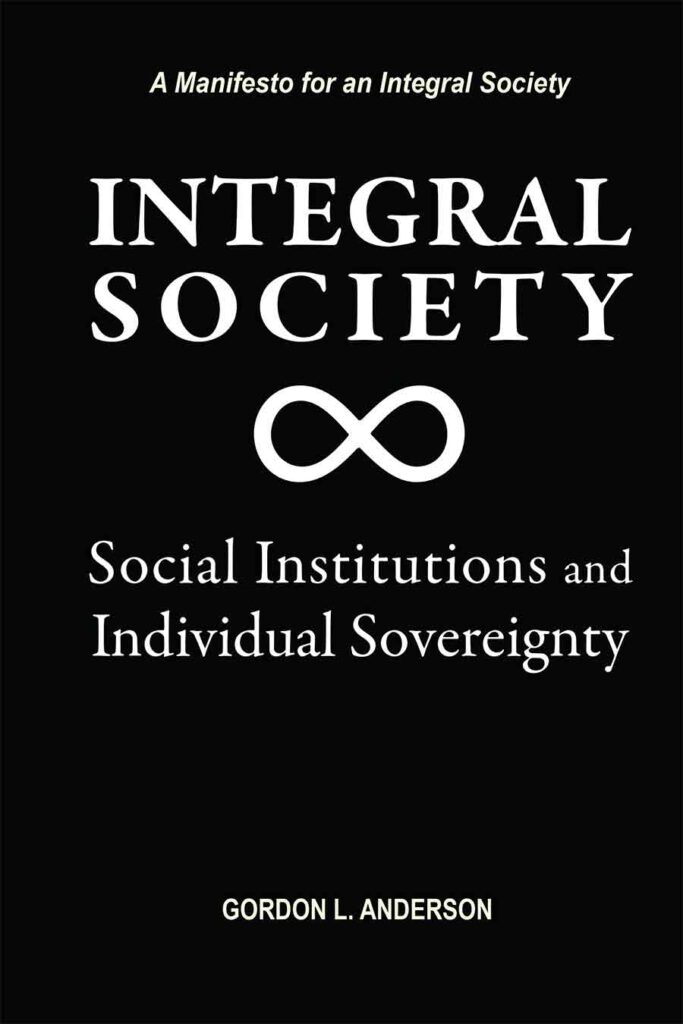An integral society is based on an integral relationship between cultural, economic, and political institutions and individuals. Culture, governance, and economy, the three primary spheres of society, are rooted in different principles related to the three natural social orders of communication, money, and law. These institutions have differentiated and evolved in their respective spheres and need functional integration in postmodern complex societies.
An integral society requires responsible, self-governing, and self-sufficient individuals who have developed an integral social consciousness. This consciousness transcends tribalism, religious fundamentalism, nationalism, racism, wokism, and other forms of group identity that divide human society. An integral social consciousness understands the big picture behind the cultural, economic, and political institutions so they best enable the development of autonomous individuals with an integral consciousness, thriving in harmony and peace.

The sphere of culture is based on the pursuit of love, truth, beauty, goodness, and health. Knowledge, values, and personal relationships are primary elements of the cultural sphere. The economic sphere is based on the production, trade, and exchange of goods, services, and property required to nourish and sustain our lives and our cultural pursuits. The sphere of governance involves the constitutional and legal framework whereby government uses power to act as a referee to impose rules and limits on individual and institutional behavior so that people are maximally free to sustain themselves and pursue their desires, so long as they do not harm others in the process.
Society has evolved from hunter-gatherer societies to large complex states with many social institutions in each sphere. Hunter-gatherer consciousness is based on taking rather than producing. Like animals in the wild grazing on grass, or hunting and killing other animals for food, hunter-gatherer societies subsist on natural resources that they compete for against others. Civilization, on the other hand, is rooted in the economic production of goods and services so that an abundance of food and necessities can exist for all people to live in harmony. The fundamental rules, “thou shall not kill” and “thou shall not steal,” are the most fundamental rules that underpin governance in a civilized society where the protection of life and property is necessary. In a civilized society, the cultural sphere is responsible for instilling knowledge and values of socialization that suppress animalistic hunter-gather instincts to kill and steal in the face of shortages and instill an instinct to invent and solve problems of shortages with the production of new, or more, goods and services.
Social institutions have evolved to serve people more efficiently by specializing in social functions in the three cultural spheres. For example, in the cultural sphere, there are religious and scientific institutions, schools, museums, and sports. In the economic sphere, there are banks, corporations, factories, and supply chains. In the sphere of governance, there are police, courts, and legislative bodies. Social institutions are often called “social organs” because when they perform their specific functions well, as the organs of the human body each doing their part, the entire society is healthy—and integral.
Failed states, poverty, and human rights violations are symptoms of an improperly integrated, or unprincipled, society. In the modern world, this means the lack of healthy social institutions performing their function. This stems from the failure of individuals in a society to have developed an integral social consciousness. In the absence of integral social consciousness, social institutions get hijacked for personal ends, misdirected for other purposes, and taken over by other institutions. They are run by a hunter-gather social consciousness in which selfish pursuits play out as strategic group interests, thinking in terms of conquest and theft, rather than increased production and problem-solving for the whole of society.
The science of integral society is the study of the social evolution of the relationship of the three social spheres—culture, economy, and government—and the purpose and smooth functioning of the social institutions in each sphere.
